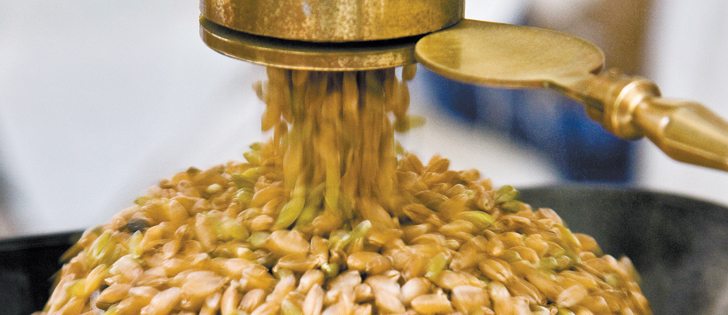With a new grain marketing era beginning Aug. 1, companies are jockeying for position to gain a larger share of the western Canadian grain trade.
Several international grain traders have recently opened or expanded operations in Canada while established Canadian Winnipeg-based companies such as Parrish & Heimbecker, Paterson Grain and Richardson International are increasing capacity, acquiring new assets and building new grain handling facilities.
Paterson, one of the five largest grain handling companies in Canada, opened a grain terminal at Gleichen, Alta., in late June. It’s about 100 kilometres west of Calgary.
Read Also

Critical growing season is ahead for soybeans
What the weather turns out to be in the United States is going to have a significant impact on Canadian producers’ prices
The Long Plain Terminal has storage for 42,000 tonnes, high-speed loading capabilities and a 130-car loop that allows unit trains to be loaded in about six hours with no need to break apart and reassemble trains.
That development comes just weeks after Paterson announced a pair of 30,000 tonne expansions at existing elevators in Killarney, Man., and Dunmore, Alta.
Canada’s second largest grain handling firm, Richardson International, is also expanding.
It is in line to acquire 19 additional grain elevators in Western Canada, including five in Alberta, 10 in Saskatchewan, two in Manitoba and two in British Columbia.
For more than $900 million, Richardson plans to buy those facilities from Glencore International, along with affiliated crop input centres, a 25 percent share in Vancouver’s Cascadia Terminal, another Viterra-owned export terminal at Thunder Bay, Ont., and two grain milling businesses, including Can-Oat Milling, which has oat processing plants at Portage la Prairie, Man., Martensville, Sask., and Barrhead, Alta.
The plan hinges on the successful execution of Glencore’s proposed $6.1 billion takeover of Viterra, which currently ranks as Canada’s largest grain handling company.
Parrish & Heimbecker, also among Canada’s top five grain handlers, is trying to acquire a 144,000 tonne grain terminal at Goderich, Ont., from publicly traded Thirdcoast Ltd.
P & H is already Thirdcoast’s largest shareholder, controlling 27 percent of its shares, but it wants to buy the facility outright to ensure it has adequate storage capacity to supply wheat to its Ontario flour milling operations.
P & H has offered to buy outstanding Thirdcoast shares for $155 per share, which would value the facility at $48 million, but Thirdcoast board members have rejected the offer and are seeking buyers elsewhere.
Foreign companies are also lining up for a piece of the action.
Last month, U.S.-based Lansing Trade Group announced plans with Olam International, a global commodities trader based in Singapore, to form a 50-50 joint venture called Lansing Olam Canada.
Olam is a huge global trader dealing in grain, food ingredients and commodities including cocoa, coffee, rice and cotton.
Lansing, an 80-year-old trading company based in Kansas, owns or leases U.S. handling facilities with a combined storage capacity of 800,000 tonnes.
Lansing handled more than 15 million tonnes of grain, feed ingredients and energy products last year.
Lansing Olam Canada will allow the two companies to source Canadian grains and oilseeds and supply them to international buyers, primarily in American, African and Asian markets.
Lansing Olam already has a presence in Winnipeg and is setting up a new office in Hamilton, Ont. It has hired former P & H wheat trader Todd Ross to act as its director of trading.
“We believe the individual company strengths of Lansing and Olam together will be able to deliver innovative solutions from origin to destination for western Canadian grain customers, much like Lansing has done in Ontario since those markets were opened up to free trade,” said Bill Krueger, president of Lansing Trade Group.
Other foreign companies vying for a piece of the western Canadian grain trade include CHS Inc., the largest farmer-owned agricultural co-operative in the United States. It deals globally in grain, food ingredients, livestock feed, crop nutrients and energy.
CHS has significant grain handling assets in northern tier U.S. states, and its trade is focused heavily on spring wheat and durum, crops traditionally marketed in Canada by the CWB.
CHS opened an office in Winnipeg in late 2011and hired former CWB grain trader Dwayne Lee to oversee Canadian operations.
Rick Dusek, vice-president of grain marketing for CHS, said his company plans to investigate opportunities in Canada, stay close to the market and build relationships with existing players in the Canadian industry.
“We have customers that are asking us to supply those commodities not only out of the U.S. but out of the entire North American market, including Canada, with these changes to the wheat board,” Dusek said.
“We see this as an opportunity to go in, build some relationships … and develop a supply chain out of Canada to complement our other supply chains out of the U.S. and even in some instances, out of the Black Sea and South America as well.”
CHS announced in May that it had acquired 51 percent of CZL Ltd., a joint venture with Japanese farmer co-op Zen-Noh that will supply commodities to Japan, primarily wheat and barley.
CHS was rumored to be aggressively seeking grain handling assets in Western Canada but so far has acquired none.
“We have not invested in any hard assets yet, but we will certainly look at that if the opportunity is right,” Dusek said.
Sources close to the grain industry say other established U.S. companies, including Bunge, Seaboard and Gavilon, are assessing opportunities in Canada or hiring new traders.
Angus Trigg, director of government and media relations for GrainCorp Ltd., one of Australia’s largest grain handling companies, said his company recently opened a new marketing office in Calgary and is exploring opportunities in the western Canadian grain market.
GrainCorp already owns Canada Malting Co., which operates three malting plants in Canada.
Also last month, Brazilian company Motomco Group confirmed that it had chosen Winnipeg as a base for its North American operations.
The company, which makes grain quality control products, will open a Canadian affiliate named Canada Moisture Analyzers and initially employ six to seven employees.
Bill Morrissey, leader of Yes! Winnipeg, a business development team affiliated with Economic Development Winnipeg, said activity related to grain marketing, agricultural manufacturing, transportation, logistics and consulting has been busier than normal.
Morrissey said the anticipated loss of more than 300 jobs at the CWB will affect the city’s economy, but new opportunities associated with the soon-to-be liberalized wheat and barley trade are attracting new companies and creating jobs.
“I don’t want to undermine the concern that we have for those people who may be terminated as a result of the CWB restructuring, but we do hear a lot of very encouraging and positive comments about the … potential for growth within the agriculture sector here in Winnipeg and in Manitoba,” he said.
Ross agreed that the liberalized marketing environment has generated significant business interest.
“There’s a certain chunk of the grain companies out there in the world that were just not willing to work in an environment that they couldn’t control, but now that they can go out and create their own destiny, things have changed,” Ross said.
“Western Canada was always a good environment before. There’s good laws in Canada, there’s good producers and there’s reliable production. Now that we can decide what and how and who we want to deal with, it’s a great place to do business.”

















